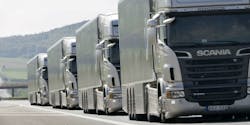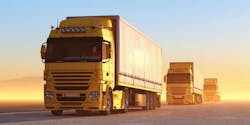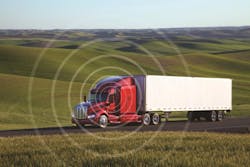The supply chain is going digital. Is trucking ready to follow?
So the material handling, logistics and supply chain trade association MHI recently unveiled its 2017 annual industry report, compiled with the help of consulting firm Deloitte Touché Tohmatsu Limited, and I think its title says it all: Next-Generation Supply Chains: Digital, On-Demand and Always-On.
Why should trucking care? Because 80% of the executives polled for this report said that the “digital supply chain” will be the predominant global supply chain model within five years, while 16% stressed that they already are digital; by which they mean everyone else needs to catch up. Fast.
Yet if supply chains go digital, trucking will need to go digital as well; that would seem to be the “table stakes” required of motor carriers in order to participate in the global transportation of goods.
Thus two questions emerge: is trucking truly ready internally for this “digital shift,” for lack of a better term, and how will this new “digital environment” affect freight shipment protocols?
MHI’s report also highlighted nine technologies that will play critical roles within digital supply chains – technologies that by now should be familiar to most in trucking in name if not in practice:
- Inventory and network optimization.
- Sensors and automatic identification.
- Cloud computing and storage.
- Robotics and automation.
- Predictive analytics.
- Wearable and mobile technology.
- Autonomous vehicles and drones.
- 3D printing.
- The Internet of Things (IoT).
A full 92% of respondents to MHI’s poll – up from 83% last year – believe at least one of those nine technologies could be a source of competitive advantage or disruption within their industries within the next 10 years.
Here’s how the industry executives polled by MHI ranked those technologies in terms of greatest disruptive potential (and again they shouldn’t surprise anyone in trucking):
- Robotics and automation: 61%, up from 39% in 2015.
- Predictive analytics: 57%, up from 38% in 2015.
- The Internet-of-Things (IoT): 55% and this is a “new” technology category in 2017 according to MHI.
- Sensors and automatic identification: 53%, up from 42% in 2015.
- Driverless vehicles and drones: 54%, up from 30% in 2015.
For your information, the folks making those predictions are the ones with their fingers on the proverbial triggers of corporate strategy – the ones who make the changes that trucking will need to respond to.
MHI said it polled 1,100 manufacturing and supply chain industry leaders on the “digital supply chain” topic across a wide range of industries, with the majority (53%) holding executive positions such as CEO, vice president, general manager or department head.
Participating companies ranged in size from small to large, with 47% reporting annual sales in excess of $100 million, and 10% reporting $10 billion or more, the trade group added.
Here are a few more trends identified by MHI’s poll worth thinking about:- Cloud computing and storage, along with sensors and automatic identification, are leading in terms of adoption rates (as in they are in-use today), with 50% and 49%, respectively. Over the next two years, the adoption of those technologies is expected to grow to 73% and 70% respectively.
- The technology predicted to be most adopted within the next two years is inventory and network optimization, forecasted at a 75% adoption rate. Over the same time frame, Robotics and Automation adoption is expected to reach a 63% adoption rate, followed by the IoT at 54% and predictive analytics at 52%.
- However, to implement any of those “critical” technologies, firms need access to a skilled supply chain workforce – and such a workforce seems to be lacking, according to MHI’s survey.
- The trade group’s poll found that hiring and retaining a skilled workforce continues to be the biggest obstacle facing supply chain professionals with 63% of respondents reporting the issue, up from 58% in 2016.
- Additionally, 50% say training their workforce to use new technologies is a top priority. Other significant challenges include customer demand for faster response times (55%) and customer demand for lower delivery cost (53%).
The final trend from this report truckers should focus upon is the opportunity now being presented to help develop what is being called “Smart City Logistics.” Basically, it’s about how to apply the nine technologies discussed earlier in ways to help cities address the growing challenges of congestion, noise and pollution associated with last mile deliveries within their increasing populations.
Yet while 50% of the respondents to MHI’s poll said they are “aware” of “Smart City Logistics” issues, only 6% say they have begun to collaborate with other companies and cities themselves to alter last mile delivery, urban distribution center and logistics hub strategies. So while the thoughts are there, the practices are not.
Could this be an opportunity for trucking to bring ideas to the table? Ideas that could help generate more revenues and profits in the long run? That’s hope only at this point. But it’s a place to start from at the very least.


